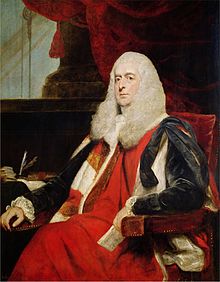Alexander Wedderburn, 1st Earl of Rosslyn
Alexander Wedderburn, 1st Earl of Rosslyn ( February 13, 1733 - January 2, 1805 ) was a British lawyer and politician of the Tories who was Lord Chancellor for several years from 1793 to 1801 in the House of Commons .
Life
Lawyer, Member of the House of Commons and Solicitor General
He was the son of Lord of Session Peter Wedderburn, Lord Chesterhall, and his wife Janet Ogilvy. After studying law , he initially worked as an advocate in 1754 , before taking up a position as a barrister in 1757 after being admitted to the bar ( Inns of Court ) of Inner Temple .
In 1761 he was elected as a candidate for the Conservative Tories for the first time as a member of the House of Commons, where he initially represented the constituency of Ayr Burghs until 1768 and then the constituency of Richmond until 1769 . During this time he was appointed Crown Attorney (King's Counsel) in 1763 for his legal services and at the same time so-called "Bencher" of the Lincoln's Inn Bar Association . In 1770 he was elected a member of the House of Commons in the constituency of Bishop's Castle , which he represented until 1774.
In 1771 Wedderburn was appointed Solicitor General of England and Wales by Prime Minister Frederick North, 2nd Earl of Guilford, succeeding Edward Thurlow , and as such was Deputy Attorney General and thus one of the most important advisors to the Crown until his replacement by James Wallace in 1778 and the government. At the same time he acted from 1771 to 1780 as Chancellor of Queen Charlotte , the wife of King George III .
In 1778 he was again elected as a member of the House of Commons, where he represented the constituency of Okehampton until 1780 .
Attorney General, Lord Chief Justice of the Common Pleas and Member of the House of Lords
Wedderburn also became Attorney General in 1778 as the successor to Edward Thurlow and held this office for two years before he was replaced again by James Wallace in 1780.
In 1780, as Lord Chief Justice of the Common Pleas, he became chairman of the Court of Common Pleas , which was then the highest civil law court in England and Wales . He was the successor to William de Gray and kept this office until his replacement by James Eyre in 1793. In 1780 he was also appointed a member of the Privy Council .
By a letters patent from June 17, 1780 Wedderburn was raised as a hereditary peer with the title Baron Loughborough , of Loughborough in the County of Leicester and thus belonged to the House of Lords until his death . Furthermore, he took over the office of Lord High Commissioner of the Great Seal in 1783 and took over the function of Lord Keeper of the Great Seal alongside William Henry Ashurst and Beaumont Hotham .
Lord Chancellor and Lord High Steward

In 1793 Wedderburn was appointed Lord Chancellor by Prime Minister William Pitt the Younger , succeeding Edward Thurlow, 1st Baron Thurlow . He held the office of Lord Chancellor until the end of his term in March 1801 and was then replaced by John Scott, 1st Earl of Eldon .
As Lord Chancellor between 1793 and 1795, he also held the office of Lord High Steward of England at the trial of the former Governor General of Fort William , Warren Hastings .
He was also between 1799 and 1805 Elder Brother of Trinity House , the beacon administration for England, Wales and the other British territorial waters. In addition, from 1801 to 1805 he was also a trustee of the British Museum .
By further Letters Patents of October 31, 1795 his elevation to Baron Loughborough , of Loughborough in the County of Surrey and finally on April 21, 1801 to the Earl of Rosslyn , of Loughborough in the County of Surrey. Both titles were awarded with a special entitlement so that these titles also to his nephew Sir James St. Clair-Erskine, 6th Baronet , and his male descendants were inheritable.
Since his first marriage to Betty Anne Dawson, on December 31, 1767, remained childless, and the only son who had emerged from his second marriage to Charlotte Courtenay on September 12, 1782, had died as an infant, his nephew inherited the two after his death Title as 2nd Earl of Rosslyn and 2nd Baron Loughborough , of Loughborough in the County of Surrey. The title of Baron Loughborough , of Loughborough in the County of Leicester, however, expired with his death.
Web links
- Alexander Wedderburn at Hansard (English)
- Entry on cracroftspeerage.co.uk
- Entry in leighrayment.com
- Alexander Wedderburn, 1st Earl of Rosslyn on thepeerage.com , accessed August 19, 2015.
| predecessor | Office | successor |
|---|---|---|
| New title created |
Earl of Rosslyn 1801-1805 |
James St. Clair-Erskine |
| New title created |
Baron Loughborough (of Loughborough in the County of Surrey) 1795-1805 |
James St. Clair-Erskine |
| New title created |
Baron Loughborough (of Loughborough in the County of Leicester) 1780–1805 |
Title expired |
| personal data | |
|---|---|
| SURNAME | Wedderburn, Alexander, 1st Earl of Rosslyn |
| ALTERNATIVE NAMES | Wedderburn, Alexander, 1st Earl Of Rosslyn, of Loughborough in the County of Surrey, 1st Baron Loughborough, of Loughborough in the County of Surrey, 1st Baron Loughborough, of Loughborough in the County of Leicester (full name) |
| BRIEF DESCRIPTION | British lawyer, politician, Member of the House of Commons and Lord Chancellor |
| DATE OF BIRTH | February 13, 1733 |
| DATE OF DEATH | January 2, 1805 |

